'We were there when Europe's guns fell silent'
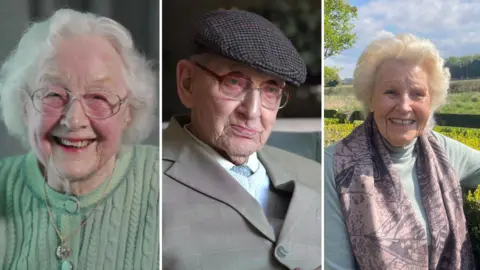 Joshua Askew/BBC
Joshua Askew/BBCOn 8 May 1945, after six long years of war, Germany surrendered and Great Britain, along with its allies, celebrated victory in Europe.
Millions of people took to the streets to drink tea, eat cake and dance.
In the South East, barbed wire defences were at last cleared from the beaches and bonfires lit at night.
The BBC has spoken to people who were there 80 years ago to recall their memories of VE Day.
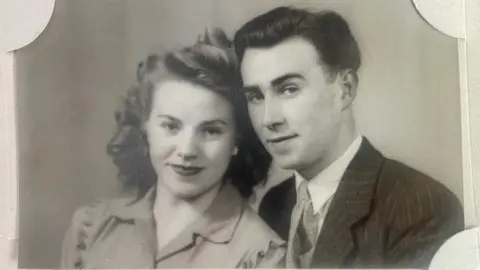 Betty Bradley
Betty BradleyBetty Bradley, who is now 97 and lives in Graffham, West Sussex, was 18 on VE Day.
Originally from London, she was evacuated in 1939 to the countryside in Norfolk, before moving to Hertfordshire and then Guildford, Surrey.
Remembering the war, she said "there were some horrible times".
"When I came out of London, I can remember going past St Paul's Cathedral with a huge hole in the road and a bus there.
"Nearly every night, the sky was red," Mrs Bradley recalled.
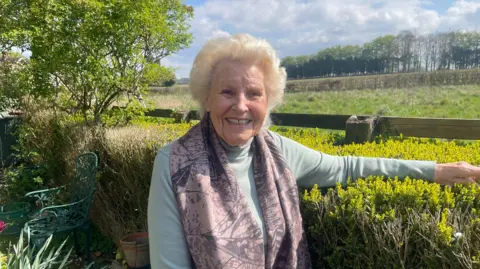
On VE Day, Mrs Bradley travelled to London and stood in front of Buckingham Palace, where she watched King George VI, Queen Elizabeth, Princess Elizabeth, Princess Margaret and Prime Minister Winston Churchill stand on the balcony.
"You can imagine the cheering that went on," she said.
"There were just thousands, millions of people in London and I can remember walking down Whitehall afterwards – at least we tried to – I felt as if I was being carried off my feet by all the crowd."
On her return home, she said: "We had the lights on which was the most exciting thing for us. We could pull the curtains open – and no more black out!"
Although VE Day came as a relief, Mrs Bradley recalled that "it was only in Europe and we still had a lot of men in the Far East and Burma and a lot of British were held in Japanese camps, so there was a lot of people who were just wishing the whole thing would finish".
Japan surrendered on 15 August 1945, ending the war altogether.
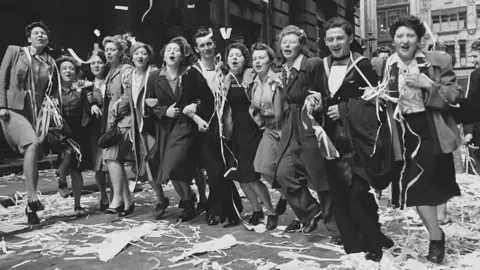 Getty Images
Getty ImagesKit Taylor, a child on VE Day, remembers being told to be quiet as the adults gathered around the radio listening to news of the ceasefire in Europe.
"I wasn't quite sure what was happening at the time," she told the BBC.
"Each time I tried to butt in, I was told to be quiet."
"Finally, there was this great cheer and everybody raised their arms [and said] it's over."
The now 89-year-old, from Folkestone, says she went playing in the street with other children and was given a bag of sweets by a local shopkeeper.
"It was a massive treat," as they had not had many sweets due to war-time rationing, she said.
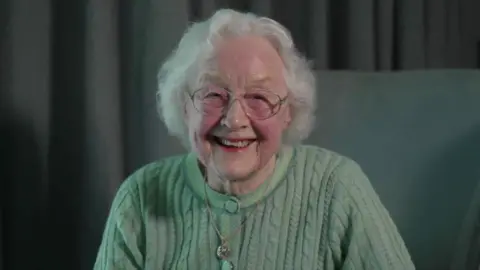
Ms Taylor, then living on Greenfield Road, said people had a "huge mixture of emotions".
"Some of us hadn't seen our fathers the whole of the war... but it [the mood on the streets] was absolutely hysterical."
"Everybody was so happy – you didn't often see that," she laughed.
Folkestone was heavily bombed during WW2 due to its close proximity to mainland Europe.
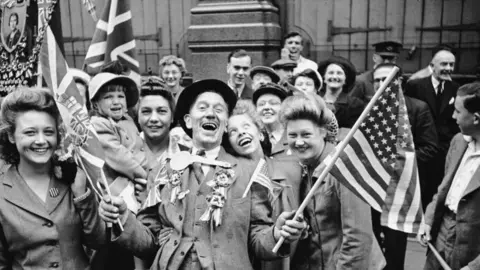 Getty Images
Getty ImagesLiving in fear of gas attacks and having to run into bomb shelters, Mr Taylor recalled a neighbouring street being "completely wiped out" by a doodlebug.
"For this town [the war] was really bad, but for us as children... we'd never known anything different."
Raymond Stapley spent time as a carpenter during the war repairing homes damaged by the fighting, but was working on the railways the day Europe's guns fell silent.
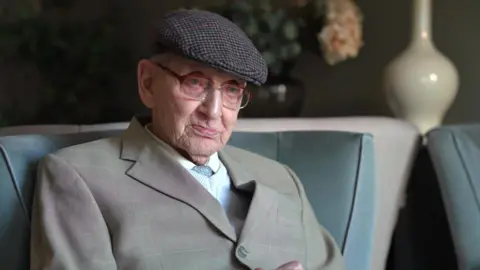
Getting off the train at Folkestone in his work gear, he remembers a big party with the women and men - dressed up as "best they could" - playing musical instruments until late at night.
"We were excited," Mr Stapley said. "The war had finished. There were no more planes going over."
"No more worrying at night time," the now 96-year-old added.
Follow BBC Sussex on Facebook, on X, and on Instagram. Send your story ideas to [email protected], or WhatsApp us on 08081 002250.
